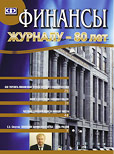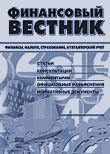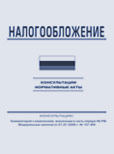Cодержание
Актуально
О необходимости временного перехода на однолетний бюджет.
Текст закона, принятого Государственной Думой 25 сентября 2015 г., одобренного Советом Федерации 30 сентября 2015 г. и подписанного Президентом РФ 30 сентября 2015 года.
Т.В. Шевцова, заместитель министра обороны Российской Федерации
E-mail: svetlana0685@yandex.ru
Указом Президента РФ в перечень профессиональных праздников и памятных дней введён День финансово-экономической службы Вооружённых Сил Российской Федерации. Согласно Указу, отмечать этот праздник военные финансисты будут ежегодно 22 октября.
Появлению Указа предшествовала кропотливая работа с архивными документами, благодаря чему удалось дополнить историю возникновения и формирования армейских финансовых органов, а также по-новому оценить вклад военных финансистов в повышение обороноспособности страны.
Статья посвящена истории и сегодняшнему дню ФЭС ВС РФ.
Ключевые слова: финансово-экономическая служба, финансовые отделы, материальное и финансовое обеспечение, финансирование действующей армии, модернизация Вооруженных Сил.
Финансы и бюджет: проблемы и решения
В редакционном материале излагаются основные тезисы докладов на Всероссийском форуме финансистов, состоявшемся 9-10 октября 2015 г. в Красногорске Московской области. В выступлениях руководителей Минфина России давался конкретный анализ особенностей бюджетного процесса текущего периода. На форуме говорилось о том, что сами финансисты на федеральном и региональном уровне должны добиваться повышения результативности в своей работе.
Ключевые слова: бюджетный процесс, эффективность расходов, остатки средств, государственные программы.
Д.Н. Кулаков, заместитель министра финансов Оренбургской области
Д.С. Мусин, начальник отдела целевых программ министерства
E-mail: mdse@mail.orb.ru
Повышение эффективности бюджетных расходов на современном этапе остается одной из самых актуальных задач бюджетной политики государства. Необходимость решения этой задачи стала основой для перехода к программно-целевому планированию. Но на практике осуществляемые расходы не всегда приносят планируемые результаты. В числе причин – не совсем верно определенные цели, задачи, показатели, изменение экономической ситуации, воздействие факторов природно-техногенного характера и многое другое.
Авторы статьи делятся своим опытом работы над ошибками в реализации программно-целевого планирования и приглашают своих коллег из других регионов страны поделиться своим опытом и принять участие в обсуждении этой важной проблемы на страницах журнала «Финансы».
Ключевые слова: бюджетные расходы, эффективность, оценка, государственные программы.
Казначейство: становление и развитие
С.Е. Прокофьев, заместитель руководителя Федерального казначейства, заведующий кафедрой «Государственное и муниципальное управление» Финансового университета при Правительстве РФ, доктор экономических наук, профессор
E-mail: efedyainov@roskazna.ru
В условиях экономической стагнации в Российской Федерации очень важным является вопрос поиска новых источников для покрытия текущего дефицита федерального бюджета. Одним из путей решения этой задачи является использование различных инструментов для проведения Казначейством России активных операций с временно свободными средствами Единого казначейского счета федерального уровня (ЕКС ФУ). Механизм залогового размещения средств общественного сектора экономики должен стать одним из долгосрочных трендов в процессе формирования и реализации финансово-бюджетной политики Российской Федерации.
Ключевые слова: федеральный бюджет, временно свободные средства, залоговое размещение средств.
Налоги: теория и практика
И.В. Горский, профессор кафедры «Налоги и налогообложение» Финансового университета при Правительстве РФ, доктор экономических наук
E-mail: igor-gorskij@yandex.ru
Автор выделяет этапы становления налоговой системы в пореформенной России, акцентируя внимание на беспорядочной раздаче налоговых льгот, что оборачивалось огромными потерями для бюджета. В регионах тогда практиковалось свободное налоговое творчество. С принятием Налогового кодекса и стабилизацией экономической ситуации налоговая система приняла упорядоченный вид. Автор допускает возможность и даже необходимость увеличения налоговой нагрузки на текущем этапе.
Ключевые слова: налоговая система, налоговая политика, принципы налогообложения, Налоговый кодекс, налоговые льготы, налоговое бремя.
Н.И. Малис, заведующая кафедрой «Налоговое консультирование» Финансового университета при Правительстве РФ, профессор, кандидат экономических наук
E-mail: malis.nina@mail.ru)
Н.А. Горохова, заместитель заведующего кафедрой, доцент кафедры кандидат экономических наук
E-mail: natali328@yandex.ru
И. Г. Кивико, первый заместитель министра финансов Республики Крым
E-mail: ikivi@rambler.ru
С 2015 г. Республика Крым в полной мере перешла в правовое поле Российской Федерации. Опираясь на обширный статистический материал, авторы анализируют проблемы бюджетной и налоговой политики. Они подытоживают исполнение регионального бюджета за 2014 г., а также раскрывают параметры бюджета на 2015 год. Большое внимание уделяется приоритетам социально-экономической политики региона.
Ключевые слова: бюджет Республики Крым, налоговые поступления, налоговый потенциал, налог на доходы физических лиц, местные налоги, транспортный налог, акцизы, бюджетные трансферты.
О. С. Салькова, доцент кафедры «Финансы и кредит» Кемеровского государственного университета, кандидат экономических наук
E-mail: о_salkova_72@mail.ru
Обоснованность принимаемых решений по налоговой оптимизации организации зависит от содержания и информативности критериального показателя, применяемого в оценке налоговой нагрузки. В статье аргументируется необходимость применения показателя расчётной прибыли для этой цели, а также показана связь других показателей с финансовым положением предприятий и организаций.
Ключевые слова: критериальный показатель, расчетная прибыль, налоговая нагрузка, планирование.
Страхование
А.П. Архипов, профессор кафедры управления рисками, страхования и ценных бумаг РЭУ им. Г.В.Плеханова, доктор экономических наук
E-mail: aarkhipoff@yandex.ru
И.П. Хоминич, заведующая кафедрой, доктор экономических наук, профессор
E-mail: 9204977@mail.ru
О.В. Саввина, доцент РЭУ им. Г.В.Плеханова, кандидат экономических наук
E-mail: osavvina@yandex.ru
По результатам исследований лучших зарубежных надзорных практик в статье излагается возможная пруденциальная модель страхового надзора для России. Предлагаемая модель содержит ряд взаимосвязанных надзорных процессов, обеспечивающих возможность раннего предупреждения утраты платежеспособности на основе постоянного мониторинга и оценки рисков страховщика и выявление зон повышенного риска в целях своевременного принятии превентивных мер. Для оценки рисков страховщика сформулированы критерии для стресс-тестирования и методика расчета сводного уровня собственных рисков страховщика.
Ключевые слова: страховой надзор, модель пруденциального надзора, критерии оценки рисков, программа управления рисками.
Е.В. Злобин, доцент, кандидат исторических наук
E-mail: Evgeniy_zlobin@rgs.ru
Л.А. Марусенкова, кафедра страхования и налогообложения, Академия труда и социальных отношений
В статье описывается система страхового образования, которая сложилась в России за последние 25 лет. Особое внимание уделено подготовке по страховым специальностям в университетах и колледжах. Анализируются основные проблемы, выделены главные этапы в развитии страхового образования. Авторы статьи приходят к выводу, что на кафедрах по-прежнему не учитывают реальные потребности страховых компаний и страхового рынка как главного работодателя и потребителя их «продукции». Одновременно отмечается, что сближению преподавания с практикой и актуализации учебных программ способствует учреждение страховыми компаниями напрямую собственных профильных кафедр в университетах.
Ключевые слова: страховое образование, образовательные стандарты, профессиональные стандарты, кафедры страхования.
Вопросы теории финансов
М.И. Яндиев, доцент экономического факультета МГУ им. М.В. Ломоносова, кандидат экономических наук, доцент
E-mail: mag2097@mail.ru
В статье обосновывается возникновение принципиально новой модели финансовых отношений в сети «Интернет». Утверждается, что в ближайшие годы появится модель интернет-финансов, ключевой особенностью которой станет разрушительное воздействие на современную финансовую инфраструктуру большинства стран мира и следование правилу «будущие деньги дороже настоящих».
Ключевые слова: теория, финансы, модель, развитие.
Финансы зарубежных стран
М.А. Котляров, главный научный сотрудник Центра отраслевой экономики Научно-исследовательского финансового института Минфина России, доктор экономических наук, профессор
E-mail: kotlyar2005@list.ru
И.Н. Рыкова, руководитель центра отраслевой экономики Научно-исследовательского финансового института Минфина России, доктор экономических наук, академик РАЕН
E-mail: rycova@yandex.ru
В статье рассмотрены отдельные аспекты формирования дивидендной политики компаний с государственным участием в Китае. Подчеркивается, что опыт Китая и стран Юго-восточной Азии в области дивидендной политики компаний с государственным участием представляет интерес для России, перед которой стоят аналогичные вызовы – необходимость соблюдения баланса государственного и частного сектора экономики, пополнения бюджета, реализации крупных инвестиционных программ и инфраструктурных проектов, развитие национального финансового рынка и повышение эффективности экономики.
Ключевые слова: компания с государственным участием, дивидендная политика, государственный бюджет, финансовая стабильность .
Научные исследования аспирантов и соискателей
С.В. Кашин, аспирант Финансового университета при Правительстве РФ
E–mail: sergei.kashin@mail.ru
В статье обосновывается необходимость создания единого понятийного аппарата с целью унификации использования актуального для теории и практики формирования финансовых центров термина «финансовый центр», а также уточнения классификации финансовых центров в зависимости от степени их вовлеченности в мировой финансовый рынок.
Результатом исследования является уточненное определение термина «финансовый центр», сформированная автором методология градации финансовых центров и предложенная их классификация.
Ключевые слова: финансовый центр, международный финансовый центр, финансовая активность, классификация финансовых центров.
Annotation
About the necessity of temporary transition to one – year budget.
Text of the law passed by the State Duma on 25 of September 2015 approved by the Council of Federation on 30th September 2015 and signed by the President of the Russian Federation on 30th of September 2015.
T.V. Shevtsova, deputy Minister of Defense of the Russian Federation.
Day of the Financial – economic service of the Armed Forces of the Russian Federation was introduced into the list of professional holidays and memorial days by the decree of the President of the Russian Federation. According to the Decree military financiers will celebrate this holiday annually on 22 of October.
Painstaking job with archival documents preceded to appearance of the Decree, it helped to complete the story of creation and formation of the army’s financial bodies and also in the modern way assess contribution of military financiers in improvement of the country’s defense potential.
Article is devoted to the history and present day of the Financial – economic services of the Armed Forces of the Russian Federation.
Keywords: financial – economic service, financial departments, material and financial provision, financing of the front – line forces, modernization of the Armed Forces.
Editorial material states the main theses of reports at the all – Russian Forum of financiers held on 9 – 10 October 2015 in the Krasnogorsk, Moscow Region. Specific analyzes of budgetary process of the current period was given in the speeches of heads of the Ministry of Finance of Russia. It was told at forum that the financiers at the federal and regional levels should improve the efficiency in their work.
Keywords: budgetary process, efficiency of expenditures, cash balance, state programs.
D.N. Kulakov, deputy Minister of Finance of the Orenburg region
D.S. Musin, head of Department of target programs of the Ministry
E-mail: mdse@mail.orb.ru
Increase of the efficiency of budget expenditures at the present stage remains one of the most urgent tasks of budgetary policy of the state. Necessity to solve this problem became the basis for transition to target - program budget planning. But in practice realized expenditures not always achieve planned results.
Among the reasons: not quite correctly defined targets, goals, indicators, changes in economic conditions, impact of factors of natural and man – caused character and etc.
Authors of the article share their experience of work on mistakes in implementation of program – target planning and invite their colleagues from other regions of the country to share their experience and take part in the discussion of this important problem in the pages “Finance” journal.
Keywords: budget expenditures, effectiveness, assessment, state programs.
S.E. Prokofiev, deputy head of the Federal Treasury, head of chair “State and municipal management” of the Financial University under the Government of the Russian Federation, doctor of economic sciences, professor
E-mail: efedyainov@roskazna.ru
In the conditions of economic stagnation in the Russian Federation the question of search of new sources to cover the current Federal budget deficit becomes very important. One way to solve this problem is the use of various tools by the Treasury of Russia to conduct active operations with temporarily free funds of the Single Treasury account of the Federal level (STA FL). Mechanism of pledged funds placement of public sector of the economy should be the one of long – term trends in the process of formation and implementation of financial – budget policy of the Russian Federation.
Keywords: federal budget, temporarily free funds, pledged funds placement.
I.V. Gorskij, professor of chair “Taxes and taxation” of the Financial University under the Government of the Russian Federation, doctor of economic sciences
E-mail: igor-gorskij@yandex.ru
Author distinguishes the stages of formation of tax system in the pre – reform Russia focusing attention on the disorderly distribution of tax benefits that led to huge losses for the budget. At that time free tax creative work was practiced in the regions. With the adoption of the Tax Code and stabilization of economic situation tax system became normally ordered. Author admits the possibility and even necessity of increasing the tax burden at current stage.
Keywords: tax system, tax policy, taxation principles, Tax Code, tax benefits, tax burden.
N.I. Malis, head of chair “Tax consulting” of the Financial University under the Government of the Russian Federation, professor, candidate of economic sciences
E-mail: malis.nina@mail.ru
N.A. Gorohova, deputy head of chair, associate professor of chair, candidate of economic sciences
E-mail: natali328@yandex.ru
I.G. Kiviko, first deputy Minister of Finance of the Republic of Crimea
E-mail: ikivi@rambler.ru
Since 2015 Republic of Crimea fully moved into the legal field of the Russian Federation. Based on extensive statistical material authors analyze the problems of budgetary and tax policy. They summarize the execution of regional budget in 2014 and also reveal the parameters of budget for 2015. Great attention is paid to the priorities of socio – economic policy of the region.
Keywords: budget of the Republic of Crimea, tax revenues, tax potential, income tax of individuals, local tax, transport tax, excise, budget transfers.
O.S. Salkova, associate professor of the department "Finance and credit" of the Kemerovo State University, candidate of economic sciences
E-mail: о_salkova_72@mail.ru
The validity of decisions on tax optimization of the organization depends on the content, in-formative criteria indicators used in the assessment of the tax burden. The article analyzes the existing assessment criteria of the tax burden, argued the need for the estimated profit indicator in the assessment of the tax burden to meet the challenges of tax optimization organization.
Keywords: the tax burden of organization, evaluation criteria of the tax burden, tax planning, tax optimization, tax optimization reserves, intensive and extensive use of factors of production resource.
A.P. Arkhipov, professor of chair “Risk management, insurance and securities” of the Plekhanov Russian University of Economics, doctor of economic sciences.
E-mail: aarkhipoff@yandex.ru
I.P. Khominich, head of chair, doctor of economic sciences, professor
E-mail: 9204977@mail.ru
O.V. Savvina, associate professor of the Plekhanov Russian University of Economics, candidate of economic sciences
E-mail: osavvina@yandex.ru
In the article the results of studies best foreign Supervisory practices proposed prudential insurance supervision model.
The proposed model contains a number of interrelated oversight processes that provide early warning of loss of solvency on the basis of continuous monitoring and risk assessment of the insurer and the identification of high-risk areas to ensure timely adoption of preventive measures. The main aim of evaluating risks is to promote the development of internal risk management of each insurer, the increasing awareness of the leadership of the insurer relationships between risks and the necessary amount of capital to cover them. To assess the risk of the insurer algorithm is developed, defined, taking into account the current situation on the insurance market, risk factors, criteria for stress testing and the method of calculation of the consolidated level of own risk of the insurer.
The proposed addition of control functions for insurance supervision methods of supervision will increase the responsibility of the management of insurance organizations for making management decisions, identify areas of risk and insurance organizations with an increased risk of loss of financial stability.
Keywords: insurance, insurance supervision, a model of prudential supervision, the procedure and criteria of assessment of own risks of insurers, the risk management program.
E.V. Zlobin, associate professor, candidate of historical sciences.
E-mail: Evgeniy_zlobin@rgs.ru
L.A. Marusenkova, department of Insurance and taxation, Academy of Labor and Social Relations
This article describes the system of insurance education in Russia for the past 25 years. Special attention is given to preparing the insurers at universities and colleges. It analyses the main problems, emphasizes the main stages in the development of insurance education. Authors conclude that the departments still do not take into account the real needs of insurance companies and insurance market as a key employer and consumer of their “products”. At the same time it is noted that establishment of own profile departments in the universities directly by insurance companies promotes rapprochement of teaching with practice and actualization of training programs.
Keywords: insurance education, educational standards, professional standards, insurance departments.
M.I. Yandiev, associate professor of Economic faculty of the Lomonosov Moscow State University, candidate of economic sciences, associate professor
E-mail: mag2097@mail.ru
Article substantiates the appearance of fundamentally new model of financial relations in the network “Internet”. It is alleged that within the next few years model of internet – finance will appear, the key feature will be destructive impact on modern financial infrastructure of most countries of the world and following the rule “future money are more expensive than real”.
Keywords: theory, finance, model, development.
M.A. Kotlyarov, chief researcher of the Center of Industrial Economics of the Financial Research Institution, doctor of economic sciences, professor.
E-mail: kotlyar2005@list.ru
I.N. Rykova, head of the Center of Industrial Economics of the Financial Research Institution, doctor of economics, academician of the RANS.
E-mail: rycova@yandex.ru
The article examines some aspects of the formation of dividend policy of state owned enterprises (SOEs) in China. It is emphasized that the experience of China and other states of South-East Asia in the field of dividend policies of SOEs may be useful for Russia. Russia faces similar challenges, namely – the balance of public and private sector of the economy, the need to provide state revenues, the implementation of mega investment programmes and infrastructure projects, development of the domestic financial market and the overall efficiency of the national economy.
Keywords: state owned enterprise, dividend policy, state budget, financial stability.
S.V. Kashin, post – graduate student of the Financial University under the Government of the Russian Federation
E–mail: sergei.kashin@mail.ru
Here is a necessity of maintaining the unified conceptual framework for using in actual theory and practice of “financial center” forming, and refining the classification of financial centers depending on their degree of involvement in the world financial market has been explained in the article. Clarification of the definition “financial center”, methodology of its gradation and classification formed by the author are the result of research.
Keywords: financial center, international financial center, financial activity, financial centers classification.
Article provides comments on some findings of research of Expert RA devoted to the 600 largest (on sales index) Russian corporations. The list includes both public and private companies and it’s established that the last have higher productivity of labor. “Club 600” “entrance ticket” is now evaluated in average 576 million USD. Russian companies would confidently occupy leading positions in Eastern Europe rating of Deloitte Central Europe (includes 500 corporations of the countries of the region).
Keywords: objects of rating, investment activities, financing sources, insurance premium, life insurance, reinsurance.











